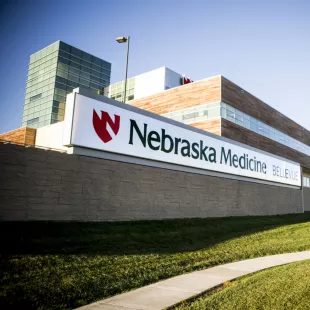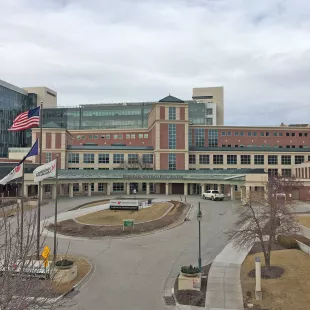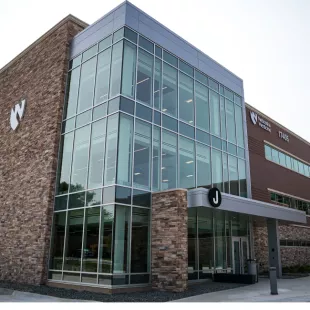Whether your heart is beating too fast, too slow, or at an irregular cadence, the advanced team of cardiac electrophysiologists at Nebraska Medicine are regional leaders ready to help and handle even the most difficult cases. Abnormal heart rhythms can lead to blood clots, stroke, damage to other organs, and sudden cardiac arrest. By understanding your risk, knowing what symptoms to look for, and actively incorporating prevention and treatment measures, you can successfully manage these conditions.
Irregular Heart Rhythm
Conduction Abnormalities – Our Electrophysiology team will assess and treat your rhythm problems that may include a slow, a fast or an irregular heartbeat.
Normally the electrical impulses travel through the conduction system of your heart very effectively. However, if you have premature beats, slow heart rates, and/or fast heart rates, your heart function can be suboptimal. This may result in an ineffective contraction of the heart that may compromise the heart function and be associated with symptoms such as shortness of breath, fatigue, dizziness, chest pain or loss of consciousness (i.e. syncope). Our goal in treating these abnormalities is to decrease your symptoms and prevent problems that are associated with these abnormal rhythms. While medications may be effective in restoring your heart rhythm, you may need additional procedures to optimize your heart rhythm and heart function.
Specific Rhythm or Conduction Abnormalities We Treat
- We treat all forms of Bradycardia (a slow heart rate)
- Sinus node dysfunction
- Chronotropic incompetence (the heart rate does not accelerate appropriately in response to activity)
- Heart block
- We treat all forms of Tachycardia (a fast heart rate) including
- Atrial Fibrillation (Afib)
- Supraventricular tachycardia (SVT), an abnormal fast heart rate involving the upper chamber of the heart
- AV Nodal Reentrant Tachycardia (AVNRT)
- Atrial Tachycardia (ART)
- Atrial Flutter (typical or atypical flutter)
- Arrhythmia due to an abnormal pathway including Wolff-Parkinson-White Syndrome (WPW)
- Ventricular arrhythmia, an abnormal fast heart rate in the lower chamber of the heart
- Premature ventricular contractions (PVCs)
- Ventricular tachycardia (VT)
- Ventricular fibrillation
Procedures We Perform
The Nebraska Medicine Electrophysiology team utilize a variety of cardiac electronic implantable devices and medical procedures such as radiofrequency ablation, cryo-ablation, and laser lead extraction to manage your rhythm and cardiac device problems.
Techniques for Ablation
- Our team uses a minimally invasive method of applying thermal energy (radiofrequency-ablation) or freezing (cryo-ablation). These techniques use catheters within the heart to ablate the areas that cause the abnormal heart rhythms. While some rhythm abnormalities are easier to ablate and cure, others utilize advanced techniques and skills that may require multiple catheters inside the heart to successfully treat difficult and recurrent rhythm problems.
- Convergent ablation: Convergent ablation combines traditional ablation techniques described above with the application of ablation lesions on the outside of the heart. Currently this ablation is performed for patients with advanced atrial fibrillation disease. Our physicians use a minimally invasive catheter approach along with making a small incision underneath the breastbone and apply energy to specific areas to fix the heart. We perform this procedure with our cardiothoracic surgeons who also perform the Maze Surgical Procedure as a treatment strategy for atrial fibrillation.
Cardiac Implantable Electronic Devices (i.e. Pacemakers and Defibrillators)
- Traditional pacemaker systems that we implant can contain one, two, or three pacing wires dependent on the needs of the patient for treatment of bradycardia (slow heart rates).
- More recently, a leadless pacemaker has become available for select patients who only require pacing in one chamber. They are self-contained pacing units that are implanted directly into the right ventricle of the heart. This advancement alone reduces the long-term risks of having pacemaker leads in the veins of the cardiovascular system.
- Implantable Cardioverter Defibrillator (ICD) and Subcutaneous defibrillators (SubQ ICD) are devices that monitors heart rhythms, and pace or deliver an electrical shock to stop a dangerous rhythm.
Laser Lead Extraction
- Occasionally, one or more leads need to be removed due to damage to the lead, scar tissue buildup, infection and/or other issues. A laser is placed over the lead to free the lead from scar tissue within the blood vessels. Once it is medically appropriate, a new lead and/or system can be re-implanted to reestablish a reliable and functional cardiac device (i.e. a pacemaker or defibrillator).
Stroke and Bleeding Reduction with Atrial Fibrillation
- Left Atrial Appendage Occlusion - Selected patients with atrial fibrillation who would benefit from blood thinners to prevent stroke, but are unable to take the medication may be a candidate for left atrial appendage occlusion. The left atrial appendage is a blind pouch in the left upper chamber of the heart that can be a source of blood clot resulting in stroke for patients with atrial fibrillation. By placement of an occlusion device in this appendage, we can reduce the risk of stroke dramatically. Your electrophysiology provider will discuss this treatment option and if you are someone who would benefit from a left atrial occlusion device.
Other Tools Utilized
- Electrical Cardioversion - a procedure that involve shocking the heart in an attempt to restore the normal heart rhythm and terminate abnormal rhythms such as atrial fibrillation.
- Heart Monitor Studies: Monitoring devices such as an event monitor, Holter monitor or long-term monitors help to identify your rhythm problem. Identification of the type of rhythm problem is important, since we treat the various types differently. Your electrophysiology provider will then be able to discuss the options in treating the identified rhythm abnormality.
Prevention
- Nutrition, physical activity and lifestyle is always a central part of treating heart disease and preventing future problems. Any effort to incorporate these aspects into your life is encouraged.
Research and Clinical Trials
- The University of Nebraska Medical Center is Nebraska Medicine's official academic partner. That means not only are our doctors treating patients, many of them also are conducting research leading to the next generation of medications and procedures related to cardiovascular disease. See what clinical trials related to cardiovascular disease are going on right now.
Our Locations
-

Heart and Vascular Center at Bellevue Health Center
2510 Bellevue Medical Center Drive, Suite 150
Get Directions
Bellevue, NE 68123 -

-

Heart and Vascular Center at Village Pointe Health Center
17405 Burke Street
Get Directions
Omaha, NE 68118
